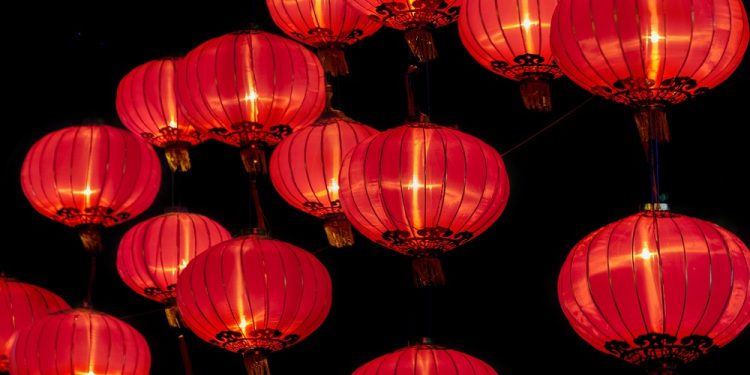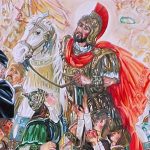
Lantern Festival
The Lantern Festival is a holiday observed on the last day of the Lunar New Year and is celebrated all over China. It is celebrated on the 15th day of the Chinese calendar, which is the last day of the Spring Festival. That means it takes place on the Gregorian calendar sometime during February or March every year.
This holiday goes by several names, including the Shangyuan Festival and the Spring Lantern Festival. Since it is the last day of the Lunar New Year, the Spring Festival cannot officially end until this day has been celebrated. During this holiday, children celebrate by carrying paper lanterns out at night and solving the riddles written on these lanterns.
It is important that this holiday not be confused with other celebrations that might bear the name Lantern Festival, particularly the Mid-Autumn festival known as the Lantern Festival in Indonesia, Singapore, and Malaysia. It also should not be confused with the Magical Lantern Festival held annually in London, or the Water Lantern Festival observed in the U.S.
The History of the Lantern Festival
The history of this festival can be traced back more than 2,000 years ago to the Han dynasty. At this time, during the reign of Emperor Ming, Buddhism was beginning to flourish across China.
Since Emperor Ming was an advocate for this religion, he decided to order all households, temples, and palaces to light lanterns on the fifteenth day of the first lunar month. This was to mirror the practice done by Buddhist monks who lit lanterns in temples on this day to pay homage to Buddha.
However, some people believe that the practice of lighting lanterns in temples is actually connected not to Buddhism but to the worship of Taiyi. Of course, with a holiday this old, no one knows for sure when it started.
There is another legend that associates the holiday with a palace maid named Yuan-Xiao. She was about to jump into a well and commit suicide, but Emperor Wu Di’s minister Dongfang Shuo saw her attempt as he was picking plum branches and decided to stop her. He listened to her tale of woe about not being able to see her family, so he decided to help her.
The Legend of the Palace Maid Yuan Xiao
Dongfang Shuo told Yuan Xiao to dress all in red and then go down to the streets of Chang’an. He instructed her to pretend to be a messenger of the god of fire. She was then instructed to tell everyone that she was ordered to burn down Chang’an and that even the Jade Emperor at the Southern Heavenly Gate would watch her commit this act of arson.
Her next instruction was to tell everyone that if they wanted to avoid this fire, then a letter written on red paper had to be hand-delivered to the Emperor and it had to be done soon. The letter was to read that “Chang’an is in great peril.
The Imperial Palace would soon be burned and the fire would last a total of 16 days. As it burns, and the city is consumed, the night sky will be illuminated red.” Emperor Wu Di was shocked and asked his minister, Dongfang Shuo, for his assistance.
Shuo told the emperor that he knew the god of fire enjoyed eating tang yuan balls and that he knew for a fact that the palace maid Yuan Xiao made the best tang yuan balls. He then suggested to the Emperor that on the fifteenth night of the first lunar month, the palace maid Yuan Xiao should make tang yuan for the god of fire.
He also said that every family in the city should do so as well. It was only in this way, he described to the Emperor, that the fire god would be appeased. He then suggested that every household should hang lit lanterns from their homes and in the streets so that the city appeared to be on fire.
It was in this way that the city would appear to be on fire and the Jade Emperor would be fooled as he watched from the Southern Heaven Gate watching the city of Chang’an. The Emperor relented to this idea and ordered people to hang lit lanterns outside their homes and on the streets and to set off fireworks.
On the sixteenth night, as the city was all lit up, Yuan Xiao’s younger sister came with her parents to look at all of the pretty burning lanterns. When she did, she saw a large lantern that had Yuan Xiao printed on it.
After reading her sister’s name on the lantern, she called out to her sister and Yuan Xiao heard her cries. Yuan Xiao then appeared before her parents and her sister. It was from this night on that she would reunite with her family regularly. Dongfang Shuo had solved her homesickness with his very elaborate plan.
Customs & Observations of the Lantern Festival
Red lanterns can be seen everywhere during this festival, not only at businesses but also at private residences and in street parades. As is customary, these lanterns all contain riddles on the side of them. A common practice performed by many people during this festival is to offer a prize to anyone who can answer the riddle on the side of the lantern.
During this time, there are a variety of dances that are performed. This includes the famous lion dance and dancing on stilts. Another common practice on Lantern Day is the consumption of a sticky rice flour dumpling called Tangyuan or tang yuan balls.
It can be filled with a variety of different fillings, which usually differ from place to place. The symbolic meaning of these glutinous rice balls is harmony and happiness. This is also a day when many fireworks are set off and enjoyed by people watching the festivities.








